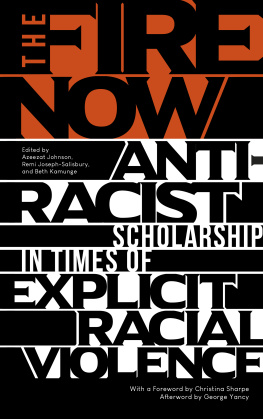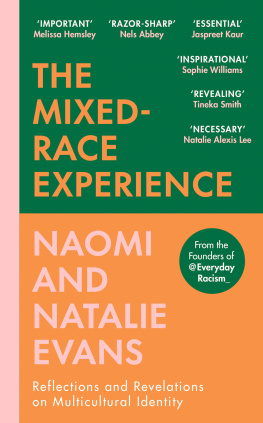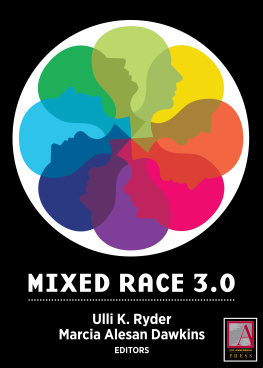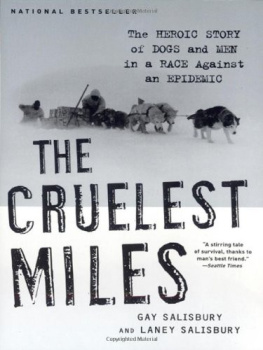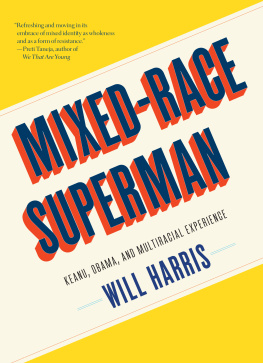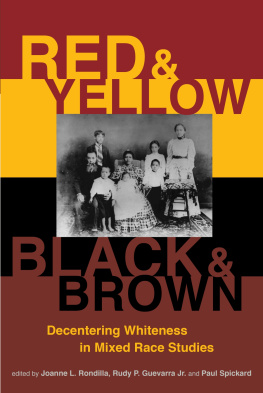BLACK MIXED-RACE MEN:
TRANSATLANTICITY, HYBRIDITY AND
POST-RACIAL RESILIENCE
CRITICAL MIXED RACE STUDIES
Edited by Shirley Anne Tate, Leeds Beckett University, UK
This series adopts a critical, interdisciplinary perspective to the study of mixed race. It will showcase ground-breaking research in this rapidly emerging field to publish work from early career researchers as well as established scholars. The series will publish short books, monographs and edited collections on a range of topics in relation to mixed race studies and include work from disciplines across the Humanities and Social Sciences including Sociology, History, Anthropology, Psychology, Philosophy, History, Literature, Postcolonial/Decolonial Studies and Cultural Studies.
Editorial Board:
Suki Ali, LSE, UK; Ginetta Candelario, Smith College, USA; Michele Elam, Stanford University, USA; Jin Haritaworn, University of Toronto, Canada; Rebecca King ORiain, Maynooth University, Ireland; Ann Phoenix, Institute of Education, University of London, UK; Rhoda Reddock, University of the West Indies, Trinidad & Tobago
Forthcoming Titles:
Shirley Anne Tate, Decolonizing Sambo: Transculturation, Fungibility and Mixed Race Futurity
Paul Ian Campbell, Identity Politics, Mixed-Race and Local Football in 21st Century Britain: Mix and Match
BLACK MIXED-RACE MEN:
TRANSATLANTICITY,
HYBRIDITY AND
POST-RACIAL RESILIENCE
BY
REMI JOSEPH-SALISBURY
Leeds Beckett University, UK
Emerald Publishing Limited
Howard House, Wagon Lane, Bingley BD16 1WA, UK
First edition 2018
Copyright 2018 Emerald Publishing Limited
Reprints and permissions service
Contact:
No part of this book may be reproduced, stored in a retrieval system, transmitted in any form or by any means electronic, mechanical, photocopying, recording or otherwise without either the prior written permission of the publisher or a licence permitting restricted copying issued in the UK by The Copyright Licensing Agency and in the USA by The Copyright Clearance Center. Any opinions expressed in the chapters are those of the authors. Whilst Emerald makes every effort to ensure the quality and accuracy of its content, Emerald makes no representation implied or otherwise, as to the chapters suitability and application and disclaims any warranties, express or implied, to their use.
British Library Cataloguing in Publication Data
A catalogue record for this book is available from the British Library
ISBN: 978-1-78756-532-6 (Print)
ISBN: 978-1-78756-531-9 (Online)
ISBN: 978-1-78756-533-3 (Epub)
ACKNOWLEDGEMENTS
Thank you to my family, friends and colleagues who have supported me in the writing of my PhD, and this book. Thank you especially to Ian and Shirley for their meticulous guidance, and to Laura for her unwavering support and confidence.
A special thank you to the experts: the Black mixed-race men themselves.
CONTENTS
Introduction
Excuse me
standing on one leg
Im half-caste.
Explain yuself
wha yu mean
when yu say half-caste
yu mean when Picasso
mix red an green
is a half-caste canvas?
explain yuself
wha yu mean
when yu say half-caste
yu mean when light an shadow
mix in de sky
is a half-caste weather?
well in dat case
england weather
nearly always half-caste
in fact some o dem cloud
half-caste till dem overcast
so spiteful dem dont want de sun pass
ah rass?
explain yuself
wha yu mean
when yu say half-caste
yu mean tchaikovsky
sit down at dah piano
an mix a black key
wid a white key
is a half-caste symphony?
Explain yuself
wha yu mean
Ah listening to yu wid de keen
half of mih ear
Ah looking at yu wid de keen
half of mih eye
an when im introduced to yu
Im sure youll understand
why i offer yu half-a-hand
an when i sleep at night
I close half-a-eye
consequently when i dream
I dream half-a-dream
an when moon begin to glow
I half-caste human being
cast half-a-shadow
but yu must come back tomorrow
wid de whole of yu eye
an de whole of yu ear
an de whole of yu mind.
an I will tell yu
de other half
of my story.
John Agard (2004, pp. 1113)
Growing up as a young Black mixed-race man, John Agards poem Half-caste sparked a rare moment of interest and inspiration in an otherwise mundane, whitewashed and Eurocentric schooling experience. It was not solely the curricular recognition of Black mixed-race identities that spoke to me but the very words of the poem resonated as profoundly with me then as they do today. Those words initiated a journey of self-discovery that culminates in, as far as there is ever a culmination of such a journey, the completion of this book.
Agards poem evokes so many memories as it returns me to those moments in my life where I felt the heightened saliency of my racial identity; the pride I felt as I wore my first Nigeria replica football shirt and the anger and hurt that soon followed as an older white boy intentionally mispronounced the name on the shirt: Nigg-er-ee-ya. This was his attempt to wound and degrade through racial epithet. Im reminded of the mixture of pride and alienation I felt as, in 2002, whilst I was at high school, the national football teams of England and Nigeria faced each other in the World Cup of that year. As I sat in the dining hall with my peers, crowded around a small screen watching the game, my allegiances became the subject of fierce debate. Those around me asserted variously that I should support England, that I cannot support England, that I should support Nigeria, that I cannot support Nigeria, and ultimately, that I cannot possibly have allegiances with both sides. Are you related to the players? was one particularly banal, yet loaded, question. Luckily, as the teams played out a boring goal-less draw, I did not have a chance to find out how my peers might have reacted had the game contained more action. What did become clear from this encounter, however, was that my peers sought to have some control over who and what I could be. They sought to erase the totality of my identity in order to situate me neatly within the Black/white racial dichotomy. My difference from my white peers was neither exclusively positive nor exclusively negative but certainly subject to my manipulation and modification. As I will discuss more fully later in this introduction, by engaging with theories of performativity and hybridity, much of my endeavour in this book is to understand these processes of negotiation, manipulation and modification. For now, let us return to my school days.




